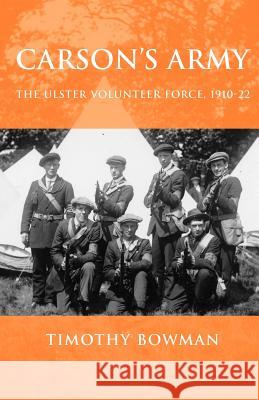Carsons Army: The Ulster Volunteer Force, 1910-22 » książka
Carsons Army: The Ulster Volunteer Force, 1910-22
ISBN-13: 9780719073724 / Angielski / Miękka / 2012 / 252 str.
The Ulster Volunteer Force (UVF) was established in January 1913, as a militant expression of Ulster Unionist opposition to the Third Home Rule Bill. It built on the foundations of pre-existing paramilitary activity and, at its height in early 1914, reached a strength of 100,000. During the Great War the UVF provided the basis of the 36th (Ulster) Division and in 1920 the force was partially reformed to counter the I.R.A. threat to the new Northern Ireland state. Academic historians have tended to overlook Ulster Loyalism. This book provides the first comprehensive study of the UVF in this period considering in detail the composition of the officer corps, the marked regional recruiting differences, the ideologies involved, the arming and equipping of the UVF and the contingency plans made by UVF Headquarters in the event of Home Rule being imposed on Ulster. Using previously neglected sources, Timothy Bowman demonstrates that the UVF was better armed and worse trained, with the involvement of fewer British army officers than previous historians have allowed. He suggests that the UVF was quite capable of seizing control of Ulster and installing the Ulster Provisional Government in the event of Home Rule being implemented in 1914, but provided few benefits to the 36th (Ulster) Division and failed to reform in any meaningful way in 1920. This book will be essential reading for military and Irish historians and their students, and will interest any general reader interested in modern paramilitary forces.











